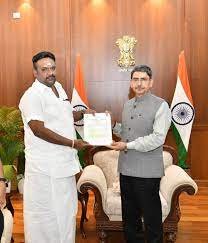In a significant development, a member of the National Commission for Protection of Child Rights (NCPCR) has confirmed the veracity of recent allegations made by Tamil Nadu Governor R.N. Ravi. The governor had raised concerns about forced virginity tests, specifically the two-finger test, being performed on alleged victims of child marriage in the town of Chidambaram. The NCPCR member, R.G. Anand, recently met with the governor at the Raj Bhavan in Chennai and submitted a copy of the investigative report on this distressing matter.
According to a social media post shared by the Raj Bhavan, R.G. Anand presented the report to Governor R.N. Ravi, shedding light on the investigation into the forced virginity tests conducted on minor girls belonging to the Dikshitar community in Chidambaram.
The revelations surrounding the alleged practice of forced virginity tests have sparked widespread outrage and raised serious concerns about the violation of child rights and dignity. Such tests are not only invasive and traumatizing but also serve to perpetuate harmful gender stereotypes and discrimination against girls. Recognizing the urgency and gravity of the situation, the NCPCR initiated a thorough investigation to uncover the truth behind these claims.
The submission of the report to Governor R.N. Ravi underscores the commitment of the NCPCR to protect the rights of children and ensure that appropriate action is taken against any form of abuse or violation. The governor’s proactive stance in highlighting this issue and seeking further investigation is commendable, as it demonstrates a strong dedication to upholding child rights and eradicating harmful practices.
The report itself is expected to contain detailed findings from the NCPCR’s investigation, including evidence and testimonies gathered from the victims and witnesses. It is likely to shed light on the prevalence of forced virginity tests, the extent of their impact on child brides, and the implications for their physical and mental well-being.
The submission of the report to the governor serves multiple purposes. Firstly, it ensures that the findings are made available to a higher authority, which can potentially lead to prompt and appropriate action. Secondly, it highlights the urgency and seriousness of the issue, calling for a comprehensive response from the concerned authorities and stakeholders to address the problem effectively.
The reception and subsequent actions taken by Governor R.N. Ravi and the Tamil Nadu government will play a crucial role in determining the outcome of this distressing situation. It is hoped that the report’s submission will prompt swift action, including a thorough investigation into the alleged perpetrators and the implementation of stringent measures to prevent any further instances of forced virginity tests.
Additionally, the findings of the NCPCR’s report can serve as a catalyst for broader societal change by raising awareness and generating conversations around child rights, gender equality, and harmful practices against girls. The issue at hand highlights the need for comprehensive measures, such as education, awareness campaigns, and policy reforms, to address deep-rooted gender discrimination and ensure the protection and empowerment of all children.
The submission of the NCPCR’s investigative report on forced virginity tests to Tamil Nadu Governor R.N. Ravi marks a crucial step towards addressing this grave issue. The report’s findings and subsequent actions taken by the authorities have the potential to bring about significant changes in safeguarding the rights and dignity of children, and in fostering a society free from harmful practices and discrimination. It is imperative that the revelations unearthed through the investigation lead to immediate and comprehensive measures to protect the rights and well-being of children in Chidambaram and beyond.


